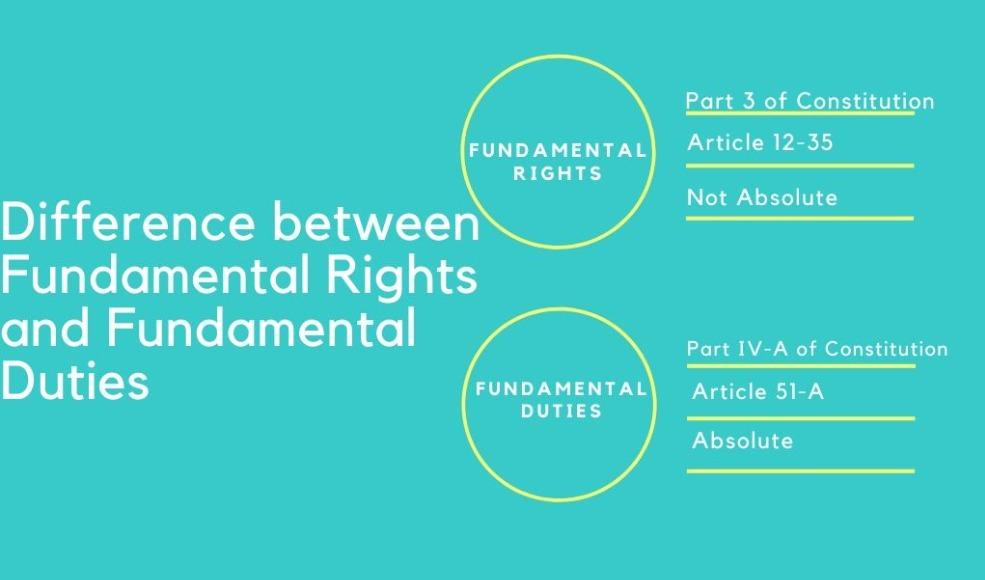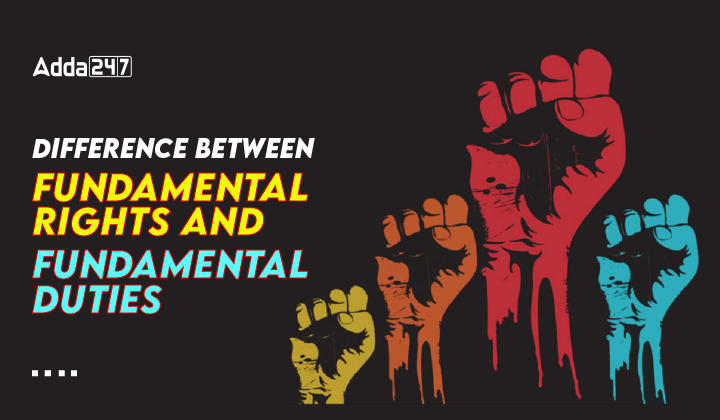Table of Contents
As per the Indian Constitution, citizens of India are endowed with both rights and duties, which are fundamental to the democratic framework of the nation. These rights and duties serve as the cornerstone of a balanced society. Fundamental rights are inherent liberties granted to individuals by the Constitution, ensuring their dignity and freedom. Fundamental duties, however, are moral obligations expected from citizens towards the nation and society, promoting civic consciousness and social harmony. In this article, we will discuss about the importance of fundamental rights and duties and discern the differences between them.
Difference Between Fundamental Rights and Fundamental Duties
Fundamental rights are like rules that protect people from the government, giving them freedoms like speaking their mind or practising their religion. On the other hand, fundamental duties are like responsibilities we have towards our country and fellow citizens, such as respecting laws and being good citizens. Rights are about what we get, while duties are about what we give back to society.
| Aspect | Fundamental Rights |
Fundamental Duties
|
| What are they? | Rights that citizens have to protect themselves from the government. |
Duties that citizens must follow for the well-being of the country and society.
|
| What do they do? | Empower citizens to demand fair treatment and freedom. |
Encourage citizens to be responsible and caring towards the country.
|
| Protection | Protect individuals from unfair actions by the government. |
Safeguard the country’s unity, heritage, and environment.
|
| Legal Action | Citizens can approach courts if their rights are violated. |
No legal consequences for failure to fulfil duties.
|
| Focus | Focuses on the benefits of citizens. |
Focuses on the welfare of the country and society.
|
| Listed in Constitution | Part III of the Indian Constitution. |
Part IV-A of the Indian Constitution.
|
| Number of Duties | 6 | 11 |
| Enforceability | Can be enforced by courts. |
Non-compliance does not lead to legal action.
|
| Role in Citizenship | Essential for individual growth and protection. |
Vital for fostering a responsible and harmonious society.
|
| Responsibility | The government is obligated to ensure rights are respected. |
Citizens are obligated to willingly fulfil their duties.
|

Fundamental Rights
Fundamental rights are basic human rights that are considered essential for the development and well-being of individuals within a society. The term “fundamental rights” in the Indian Constitution refers to certain rights that hold paramount importance due to three key reasons.
- Firstly, they are explicitly documented in the Constitution itself, making them legally binding and providing a clear framework for their protection and enforcement.
- Secondly, these rights are inherently democratic, as they are designed to ensure equal treatment, freedom, and dignity for all citizens, regardless of their background or status.
- Thirdly, fundamental rights are justiciable, meaning they can be enforced through courts if they are violated.
Part III of the Indian Constitution, spanning from Articles 14 to 35, delineates these fundamental rights. If an individual’s fundamental rights are infringed upon, they possess the right to seek recourse through the judicial system for their safeguarding. The Constitution of India specifically guarantees six fundamental rights to Indian citizens:
- Right to Equality: This encompasses the right to equality before the law, equal protection of laws within the territory of India, and prohibition of discrimination on grounds of religion, race, caste, sex, or place of birth.
- Right to Freedom: This right includes freedom of speech and expression, freedom to assemble peacefully and without arms, freedom to form associations or unions, freedom to move freely throughout the territory of India, and freedom to reside and settle in any part of the country.
- Right against Exploitation: This right prohibits trafficking in human beings, forced labor, and children working under hazardous conditions. It also prohibits the employment of children under the age of 14 in hazardous occupations.
- Right to Freedom of Religion: This guarantees individuals the freedom of conscience and the right to freely profess, practice, and propagate religion, subject to public order, morality, and health.
- Cultural and Educational Rights: These rights safeguard the rights of minorities to conserve their language, script, or culture and provide for the right of minorities to establish and administer educational institutions of their choice.
- Right to Constitutional Remedies: This right ensures that individuals can seek legal remedies from courts when their fundamental rights are violated. It empowers courts to issue writs such as habeas corpus, mandamus, prohibition, certiorari, and quo warranto for the enforcement of fundamental rights.
These fundamental rights serve as the foundation for a just and democratic society, ensuring that individuals have the freedom and opportunity to pursue their goals, participate fully in civic life, and live with dignity and respect. Governments are typically responsible for upholding and protecting these rights, and they can be enforced through legal mechanisms, such as constitutional courts or human rights commissions. However, the realization of fundamental rights often requires ongoing vigilance, advocacy, and sometimes even activism to address systemic inequalities and injustices.
Fundamental Duties
Similar to fundamental rights, every citizen in any country has fundamental duties. These duties call for citizens to take part in governing their country by fulfilling responsibilities and carrying out their duties as citizens. In India, fundamental duties are outlined in Article 51A of the Constitution and have been integrated into separate laws. Every citizen of India is obligated to:
- Respect and uphold the principles outlined in the Indian Constitution.
- Honor the National Flag and the National Anthem.
- Preserve the unity, integrity, and sovereignty of the nation.
- Foster national harmony and promote a sense of brotherhood among citizens.
- Protect and enhance the natural environment, including forests, lakes, rivers, and wildlife.
- Uphold the dignity of women.
- Show compassion towards all living beings.
- Safeguard public property and renounce violence.
- Ensure access to education for children aged 6 – 14 years, as mandated by their parents or guardians.
- Cultivate scientific curiosity, humanism, and a spirit of inquiry and reform.
It’s important to note that, unlike fundamental rights, fundamental duties are non-justiciable, meaning individuals cannot seek court intervention for their enforcement in case of non-compliance.
Conclusion
While fundamental rights offer citizens important freedoms and protections, fundamental duties serve as a reminder of their responsibility towards the progress and welfare of the nation. These duties and rights are vital in nurturing a sense of citizenship and social responsibility, which are essential for the overall development and advancement of the nation




 TSPSC Group 1 Question Paper 2024, Downl...
TSPSC Group 1 Question Paper 2024, Downl...
 TSPSC Group 1 Answer key 2024 Out, Downl...
TSPSC Group 1 Answer key 2024 Out, Downl...
 UPSC Prelims 2024 Question Paper, Downlo...
UPSC Prelims 2024 Question Paper, Downlo...
